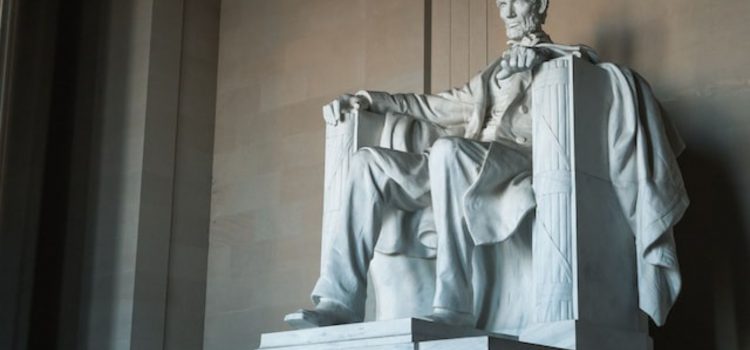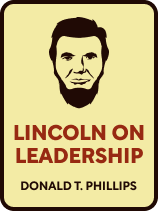

This article is an excerpt from the Shortform book guide to "Lincoln on Leadership" by Donald T. Phillips. Shortform has the world's best summaries and analyses of books you should be reading.
Like this article? Sign up for a free trial here.
What made Abraham Lincoln such an extraordinary leader? What lessons can modern-day leaders draw from Lincoln’s leadership?
From the moment he stepped into the president’s role, Lincoln was guided by his values, which informed all his actions and decisions. Although Lincoln did consult with his cabinet, he always reserved the final decision for himself.
Here are two leadership lessons from Abraham Lincoln.
Lesson #1: Consult Together, Decide Alone
The first leadership lesson from Abraham Lincoln was “consult together, decide alone.”While you should consult with your employees on possible courses of action, Phillips argues that all final decisions you make must be yours and yours alone. This strategy gives you the best of both worlds:
- By consulting with your employees, you get access to different ideas and viewpoints. If you use one of their ideas and it works, Phillips suggests you give them credit—this encourages your employees to continue doing good work.
- By making the final decision alone, you ensure that your course of action fits your overall vision of how your organization should run. In addition, if the decision doesn’t work as planned, Phillips explains that you can shoulder the blame. By not blaming your employees for ideas that don’t work out, you’ll maintain their respect and won’t discourage them from offering new ideas or suggestions.
Phillips outlines how Lincoln would often “consult together and decide alone” to help encourage and guide his employees. By offering praise or accepting blame, he subtly pushed those under him to do what he wanted—if he wanted a general to be more aggressive, for example, then he’d praise their aggressive actions or accept blame for an aggressive decision that failed. By using this strategy, Lincoln still had control over what his employees were doing, but he also made them feel like their victories were their own—encouraging them to continue doing good work.
(Shortform note: Historians note that Lincoln’s decisiveness came to define the role of the presidency during times of war and crisis. Though for Lincoln this often meant consulting with advisors and other politicians, it also often meant overriding their will—and overriding portions of the Constitution itself. These historians note that Lincoln invented the idea that the president could suspend certain rights during wartime—most notably habeas corpus, which requires that people detained for a crime be brought before a court where they can be lawfully charged. The legacy of these decisions is mixed: While scholars like Phillips argue that these decisions represented necessary decisiveness in the face of a major threat, others argue that they created dangerous precedents that later presidents would abuse.)
Lesson #2: Plan and Persevere
Making your own final decisions helps you plan and persevere—something that Phillips says every leader should do. He argues that you should create a long-term plan for your organization and then consistently stick to it. This doesn’t mean you should refuse to change your course or micromanage every single detail, but instead that you should set goals and have a general idea of how you’re going to reach them. By creating a plan and sticking with it (despite any obstacles), you’ll be able to set and maintain clear expectations for your employees regarding what they should do and how they should do it. This will help them do the kind of work you want them to do.
(Shortform note: For more advice on how you can create a long-term plan, the authors of Extreme Ownership outline several factors important for planning: resources you have available, risks you might encounter, contingency plans for those risks, and how to explain your plan in a simple and concise way. When you keep these factors in mind, you’ll create a realistic plan that’s flexible and easy to understand—all of which are important for overcoming obstacles and succeeding.)
Similarly, from the moment he came into office, Lincoln had a plan, explains Phillips. Lincoln wanted to reunite the country and abolish slavery, and every action or decision he made tried to serve that end in some way. In addition, Lincoln ensured that these goals were clear to those underneath him—and ended up replacing many generals and cabinet members who either couldn’t or wouldn’t work toward them. Phillips argues that consistently pushing toward these goals helped improve Lincoln’s decision-making, as it prevented him from stalling his own efforts or accepting short-term gains that would harm him in the long run.
| Lincoln on Slavery Most historians disagree with Phillips’s claim that Lincoln always intended to abolish slavery. Instead, they argue that Lincoln’s views and goals regarding slavery changed over time. While he always saw slavery as morally wrong, he initially saw it as politically necessary for preserving the Union. Because of these priorities, Lincoln ran on a platform that argued against the extension of slavery into the territories—not for the abolition of slavery where it already existed. He thought that instead of immediately freeing all slaves, the nation could slowly diminish and dismantle slavery over time and send former slaves to Africa. However, during the course of the American Civil War, Lincoln eventually changed his mind—writing the Emancipation Proclamation to immediately free all Confederate slaves; no longer publicly discussing the idea of sending former slaves back to Africa; and, finally, successfully pushing for the ratification of the 13th Amendment, which permanently abolished slavery. This shows that, unlike what Phillips claims, Lincoln wasn’t always working toward abolition and actually deviated from his earlier plans by writing the Emancipation Proclamation. |

———End of Preview———
Like what you just read? Read the rest of the world's best book summary and analysis of Donald T. Phillips's "Lincoln on Leadership" at Shortform.
Here's what you'll find in our full Lincoln on Leadership summary:
- A look at what Abraham Lincoln did and how he did it
- Leadership lessons you can learn from Lincoln
- Why you should consult together and decide alone






